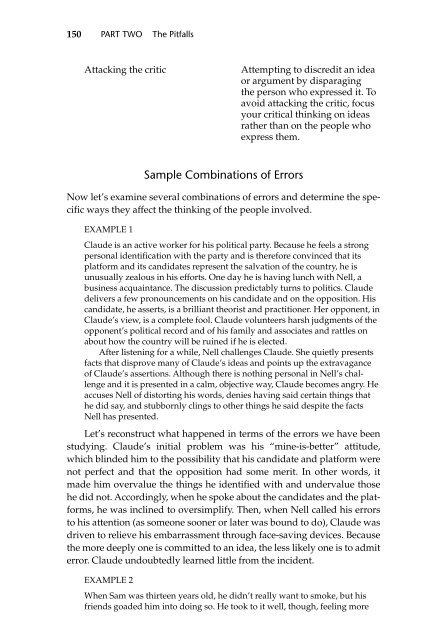Beyond Feelings
Beyond Feelings
Beyond Feelings
You also want an ePaper? Increase the reach of your titles
YUMPU automatically turns print PDFs into web optimized ePapers that Google loves.
150 PART TWO The Pitfalls<br />
Attacking the critic Attempting to discredit an idea<br />
or argument by disparaging<br />
the person who expressed it. To<br />
avoid attacking the critic, focus<br />
your critical thinking on ideas<br />
rather than on the people who<br />
express them.<br />
Sample Combinations of Errors<br />
Now let’s examine several combinations of errors and determine the specific<br />
ways they affect the thinking of the people involved.<br />
EXAMPLE 1<br />
Claude is an active worker for his political party. Because he feels a strong<br />
personal identification with the party and is therefore convinced that its<br />
platform and its candidates represent the salvation of the country, he is<br />
unusually zealous in his efforts. One day he is having lunch with Nell, a<br />
business acquaintance. The discussion predictably turns to politics. Claude<br />
delivers a few pronouncements on his candidate and on the opposition. His<br />
candidate, he asserts, is a brilliant theorist and practitioner. Her opponent, in<br />
Claude’s view, is a complete fool. Claude volunteers harsh judgments of the<br />
opponent’s political record and of his family and associates and rattles on<br />
about how the country will be ruined if he is elected.<br />
After listening for a while, Nell challenges Claude. She quietly presents<br />
facts that disprove many of Claude’s ideas and points up the extravagance<br />
of Claude’s assertions. Although there is nothing personal in Nell’s challenge<br />
and it is presented in a calm, objective way, Claude becomes angry. He<br />
accuses Nell of distorting his words, denies having said certain things that<br />
he did say, and stubbornly clings to other things he said despite the facts<br />
Nell has presented.<br />
Let’s reconstruct what happened in terms of the errors we have been<br />
studying. Claude’s initial problem was his “mine-is-better” attitude,<br />
which blinded him to the possibility that his candidate and platform were<br />
not perfect and that the opposition had some merit. In other words, it<br />
made him overvalue the things he identified with and undervalue those<br />
he did not. Accordingly, when he spoke about the candidates and the platforms,<br />
he was inclined to oversimplify. Then, when Nell called his errors<br />
to his attention (as someone sooner or later was bound to do), Claude was<br />
driven to relieve his embarrassment through face-saving devices. Because<br />
the more deeply one is committed to an idea, the less likely one is to admit<br />
error. Claude undoubtedly learned little from the incident.<br />
EXAMPLE 2<br />
When Sam was thirteen years old, he didn’t really want to smoke, but his<br />
friends goaded him into doing so. He took to it well, though, feeling more


